In 2023, the Korean American Community Foundation (KACF) published an insightful report entitled, Toward Better Aging – A National Study of Korean Older Adults.
Co-authored by Linying He, Dena Li, and Yuncheng Wang, the study provides an analysis of Korean American seniors based on surveys and focus groups conducted across the following seven study areas: Chicago, Houston, Los Angeles, New Jersey, New York City, San Francisco, and Washington, D.C.
In the context of the rapidly aging U.S. population, this study aims to fill gaps in research and policymaking to address the unique challenges and needs of the growing population of Korean older adults.
A total of 817 Korean American seniors were surveyed and a total of 63 were interviewed in focus groups. The study investigates their distinct experiences, obstacles, and priorities when accessing critical services in the following areas: housing, caregiving, transportation, finance, healthcare, and social engagement.
These findings reveal areas for future policymaking to close current gaps and improve support for this population.
SURVEY AND FOCUS GROUP FINDINGS
- Housing
The majority of Korean American seniors prefer living independently in their own homes due to the familiar linguistic and cultural setting. Regarding housing, this population values safety, proximity to healthcare services, and proximity to friends and family.
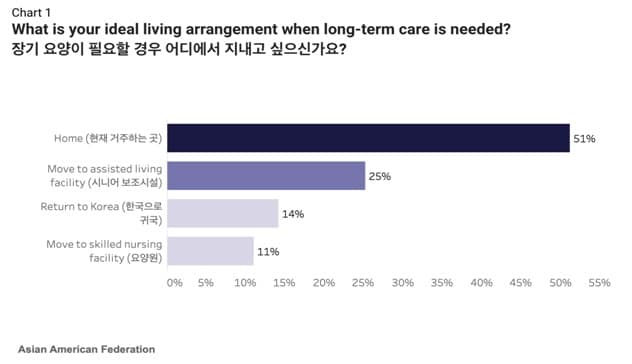
Many consider downsizing or relocating as a result of high expenses and the challenge of maintaining large homes. However, the study finds that Korean American seniors are limited in their knowledge of and access to housing options (such as assisted living) due to language barriers, elevated costs, and long waitlists.
- Caregiving
Korean American seniors strongly prefer care from family members, specifically from spouses over children. Despite this preference, they recognize the physical and emotional challenges associated with caregiving.
Applying for and maintaining eligibility for Medicaid/Medicare, keeping detailed records, and lacking resources to aid in the process present additional challenges.
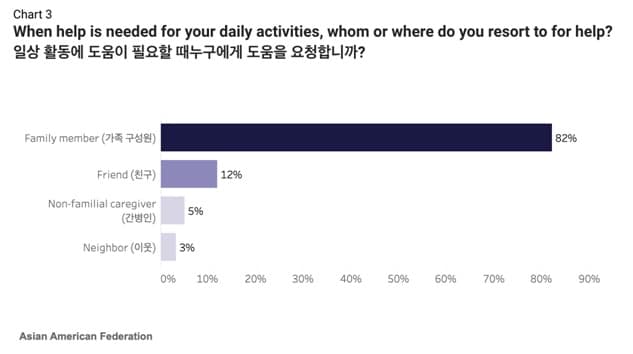
- Transportation
The vast majority of Korean American seniors drive as their primary mode of transportation. Although many older adults face difficulties driving due to poor eyesight, especially at night, they continue to drive for a few key reasons: to preserve their independence, to maintain social connections, and to access healthcare and other services.
Additionally, seniors are dissatisfied with public transportation primarily due to their distance from buses/train stations among other concerns.
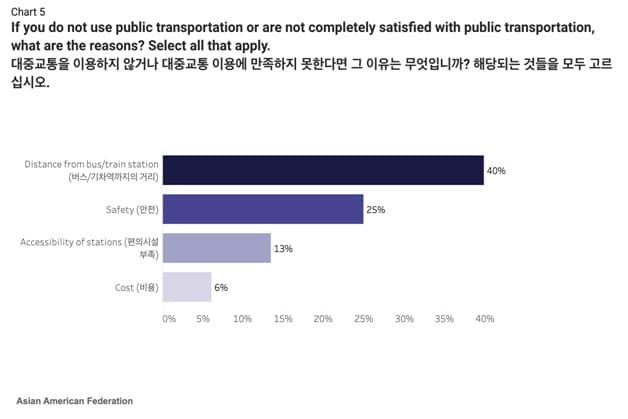
- Finance
Compared to the average American seniors, the study finds that Korean American seniors typically have lower wealth, income, and retirement benefits. Due to citizenship status, English proficiency, and duration of U.S. residency, Korean American seniors are less likely to receive Social Security income. For those who do receive Social Security income, they receive less.
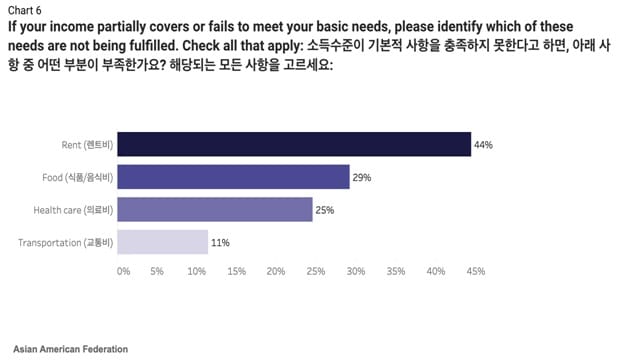
The main concern for this population is the rising cost of living, which aligns with the trend of many choosing to retire later.
- Healthcare
High cholesterol and hypertension among many other chronic conditions affect a significant portion of Korean American seniors. When navigating the complex American healthcare system, Korean American seniors face difficulty primarily due to their language barrier and lack of information on how to best use public programs, such as Medicaid and Medicare.
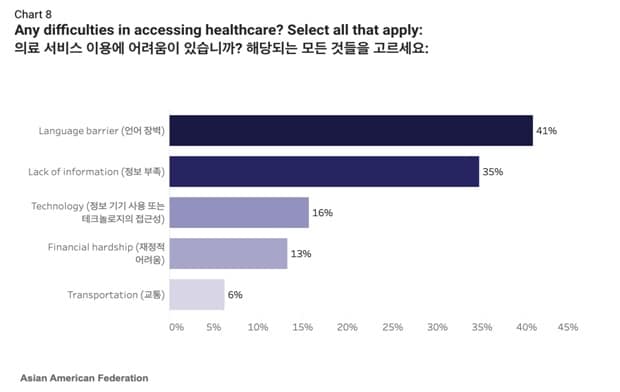
Since the COVID-19 pandemic, Korean American seniors face rising mental health issues and feel especially isolated. Within Korean communities, there is a stigma attached to seeking mental health services.
- Social Engagement
Korean American seniors find social engagement in a variety of areas, including work, church, and community-based organizations (CBOs). Employment can offer a sense of purpose and belonging for many Korean American seniors.
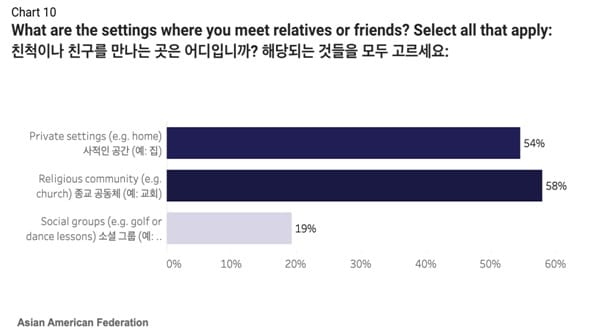
Korean American seniors primarily socialize in religious communities, and Korean American churches offer social opportunities, emotional support, and practical assistance. They also help bridge gaps in language, culture, and information.
Korean American seniors appreciate the services and activities similarly offered by CBOs, but many desire more frequent, bigger, and better-organized events and programs.
ADDRESSING POLICY GAPS FOR AGING IN PLACE
Because Korean American seniors strongly prefer aging in place, it is essential to address the policy areas that meet their unique needs:
- The Affordable Housing Crisis and Seniors
The severe shortage of affordable housing and rising living expenses present challenges for Korean American seniors with limited mobility and fixed incomes. Seniors in densely populated cities encounter multiple-year-long waiting lists for limited subsidized housing units. Even when available, the affordable housing options lack access to essential services and are located far from Korean communities, causing further isolation.
Korean American seniors face additional displacement risks due to gentrification, particularly in areas like Los Angeles’ Koreatown, where rising rents and predatory tactics push out long-term residents. These conditions reveal an urgent need for policies that address affordable housing for Korean American seniors.
- Lack of Transportation Alternatives
Korean American seniors who are unable to drive have limited mobility options, facing language and cultural barriers that prevent them from utilizing more convenient and cost-effective transit services, such as curb-to-curb and door-to-door options.
Paired with the current challenges associated with public transportation due to limited accessibility and risks to safety, these issues call for improved services and infrastructure to better serve the Korean American senior population.
- Language Barriers and Access Challenges
Without language support, resources, and information, Korean American seniors with Limited English Proficiency (LEP) lose out on subsidized housing opportunities, receive delayed or avoided treatments, and experience suboptimal care. These issues highlight the need for mandated language-appropriate services in critical public sectors, especially healthcare and caregiving.
While some existing legislative initiatives aim to provide equal access through language services, the implementation is often insufficient, with gaps in translation resources, limited awareness among service providers, and weak enforcement.
- Critical Role and Funding Challenges of Community-Based Organizations
Increasing investment in currently underfunded CBOs, particularly CBOs within Naturally Occurring Retirement Communities (NORCs), not only helps meet the growing needs of Korean American seniors, but also offers a strategic and cost-effective approach for policymakers.
As case studies show, CBOs transform NORCs into thriving communities with embedded support systems, enabling Korean Americans seniors to “age in place” with an enhanced quality of life. Funding for CBOs in NORCs reduces the need for expensive institutional care and alleviates the financial burden on government-funded health and social service programs.
References
This report was co-authored by Linying He, Associate Director of Research, and Research Associates, Dena Li and Yuncheng Wang.
